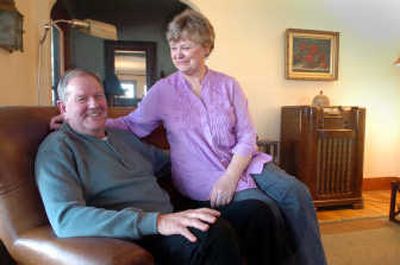Still giving, now taking own advice

Gail and John Goeller have advocated for seniors in the Inland Northwest for years.
For more than a decade, they published The Directory for Seniors, a resource guide offering advice and contact information on everything from estate planning to senior housing to Social Security.
For 12 years, they cared for five elderly relatives from old age through death. Those experiences inspired Gail Goeller to write, “Coming of Age with Aging Parents: The Bungles, Battles and Blessings,” published by Patina Productions in 2004.
In September 2004, their life took an ironic twist.
That’s when John Goeller was diagnosed with Alzheimer’s disease, joining up to 10,000 people in Spokane County and more than 2,500 in Kootenai County struggling with the degenerative brain condition. In keeping with their track record of helping seniors, the Goellers, who are 65, want to share their experiences in hopes of educating others.
Their advice: Address each new challenge as it comes. Work together and support each other. Keep your sense of humor.
For example, Gail says, when John plays golf, he tells his partners: “I may hit your ball, and it’s OK for you to tell me.” Without intending to, Gail said, John is “educating people about how to be with the disease.”
In the summer of 2004, John Goeller realized the forgetfulness he figured everyone his age had was something more serious. While shutting down the family’s cabin on Lake Coeur d’Alene after a visit, something he’s done dozens of times, he sat and stared at the power switches, trying to remember which ones to turn off. He just couldn’t remember.
Neurologist David Greeley of Spokane diagnosed Alzheimer’s, which prior to age 65 is considered “early onset.” Some 5.1 million Americans have Alzheimer’s and up to 600,000 of them are younger than 65, according to statistics from the Inland Northwest Alzheimer’s Association.
John Goeller began taking the drug Aricept to help stave off his declining brain function, and he says it’s helping. The Goellers held a family meeting with their two grown children and their spouses to discuss the diagnosis and the future. The Goellers sold the home where they’d lived for 38 years and moved two blocks away to a home in which they could live on one level, if necessary.
John Goeller wanted to continue driving as long as possible but consented to family requests to take a yearly driving test to prove his ability. The first two years, he passed. Last year, he thought he’d done pretty well until the test-giver told him he’d driven in a bicycle path and bumped posts while parking.
“I thought, ‘That’s it, I’m done driving,’ ” John Goeller said. “The thing that bothered me most was my perception that I’d done pretty well. That scared me. It still was a real loss to give up driving.”
But other loves – road biking and golf – still are possible with help and understanding from friends and family. He no longer bikes alone and he asked his golf partners to keep an eye out when he realized he was hitting other people’s balls. When he defeated family members in a recent card game, he stood up and bellowed, “How’s that for the Big A?”
He joined a men’s support group to expand his support network and give his wife a break. Other members pick him up and drop him off for the weekly meetings. The Goellers also purchased long-term care insurance.
Alzheimer’s, said Gail Goeller, is “such a bogeyman. Everybody’s in a panic – a great panic – about it.” But exposure to the disease can help dispel fear, she said. Their experiences with their five elderly relatives have helped them to not panic at every small challenge, such as when John wants to go for a walk.
“People don’t know how to be with Alzheimer’s people. Some of our best friends will say, ‘How is John doing?’ ” she said, affecting a concerned, hushed tone. “And I’ll say, ‘Ask him.’ “
The Goellers know further declines will come. They’ve had a geriatric care manager assess their home and make recommendations for safety and ease of living. But they haven’t rushed into transforming the house with support bars in the showers or ramps for an eventual wheelchair. They’re taking each day and each new development as it comes.
“I don’t want to do the whole enchilada yet,” Gail Goeller said. “We don’t know what the future holds.”